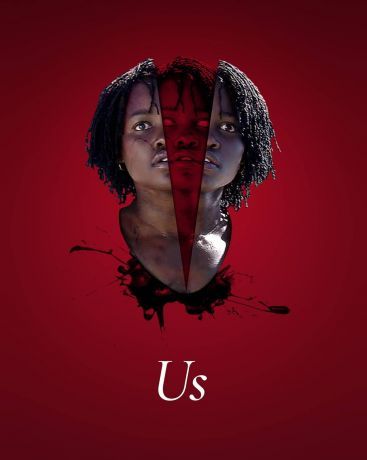Arts
You are here
"Beautiful and sort of perfect, that's where true horror lies."

March 29, 2019
Review of Us, directed by Jordan Peele
Jordan Peele, director of 2017's brilliant film Get Out, skewering racism in America, has done it again with his new movie Us, out in theatres now.
Peele has always been a fan of horror, although he was previously best known for his work as a comedian on shows such as Mad TV and Key and Peele.
The best horror movies often have a comic aspect, however twisted or macabre it may be, and Us is no exception.
In some ways the question of race is not at the centre of this movie in the way it was in Get Out, although placing a Black family at the centre of the action can't help but reverberate with audiences, in terms of the actually existing racism of the larger society.
Peele has described one of the main themes of the movie as the divisions we create between ourselves and the other, in order to distance ourselves from that which makes us afraid or that which we would prefer to ignore.
In an interview about the movie Peele revealed his influences from other directors of scary movies:
"My favorite horror images are the beautiful ones that are subverted. This is why I was drawn to The Stepford Wives, and movies like Jaws and The Shining appeal to me, is that when you have something idyllic and beautiful and sort of perfect, that's where true horror lies. In this movie, it's even — to present the shiny, happy, "Hands Across America" version of our culture with the promise of the darkness underneath."
The movie begins with a flashback to 1986 where a young Black girl (the eerily effective Madison Curry) is visiting a Santa Cruz, California amusement park with her parents. She wanders away from her parents and enters a kind of funhouse with a big neon sign which reads 'Find yourself'.
What she finds is her doppelganger, her double, which will have horrifying repercussions later on in the film.
Adelaide or Addy, the little girl all grown up, returns to the same area some 30 years later for a couple of weeks at the family cottage with her somewhat goofy husband Gabe (Winstone Duke) and her two children, teenage daughter Zora (Shahadi Wright Joseph) and younger son Jason (Evan Alex) who hides most of the time behind a monster mask.
This is definitely an ensemble piece but actress Lupita Nyong'o (of Twelve Years a Slave and Black Panther) stands out as the troubled matriarch of this clan. There is humour in the film and moments when the audience erupts in laughter. From from its very beginning, though, when the Wilsons drive up to the cottage and there is an overhead shot featuring the beauty of nature, which is definitely an homage to Stanley Kubrick's panning views in The Shining, we know all will not be well in their universe.
On their first night at the cottage the daughter Zora notices that there is a family standing in their driveway, whom we can't make out at first. It turns out that the family is a mirror image of their own, but as if seen through the distortion of a funhouse mirror.
They look like the Wilsons but they are different, with their fixed stares and animal-like, guttural speech. They are dressed in matching red overalls and wielding oversize scissors, the better to attack their counterparts.
When Addy asks who they are and her counterpart, Red, replies 'We're Americans' in deep, sepulchral tones we begin to see that the movie has more on its mind than empty scares.
At the beginning of Us, as a kind of prologue, we read the following text across the screen:
“There are thousands of miles of tunnels beneath the continental US. Many have no known purpose at all.”
As the film goes on we realize that the Wilsons are not the only ones targeted by these creatures from the netherworld. In a plot twist reminiscent of The Invasion of the Body Snatchers, it turns out there are doppelgangers for their white neighbours (ably and creepily played by Elizabeth Moss and Tim Heidecker) and perhaps for everyone else on the planet.
The question that keeps getting posed throughout the movie, "Why are they doing this? What do they want?" is answered in part by Red when she explains the impoverished life she led, while Addy lived in comparative luxury above ground.
There are echoes of this critique of materialism in the comparison between Addy's family and that of their white friends. The Wilsons seem to be comfortably middle class but their lifestyle can't compare or is definitely a lesser version of their white friends, Kitty and Josh.
This is underlined in a scene at the white couple's 'cottage', which is not really a cottage at all, but an opulent residence, complete with all the requisite technology, including 'Ophelia' (a Siri-like virtual assistant), who hilariously misunderstands the couples' plea to call the police when they are attacked by their own doppelgangers and starts playing N.W.A's 'Fuck the police'.
At least part of what Us is about (note the acronym for U.S. in the title) is the raging inequality in American society, which in a sense gives rise to these doppelgangers who rise up to partake in the wealth that has been denied them.
Peele puts a lot in his film and there will no doubt be a lot of discussions about the meaning of various sequences but there's also no doubt that he's created a film that will remain in your head long after you've seen the it.
Section:
Topics:










